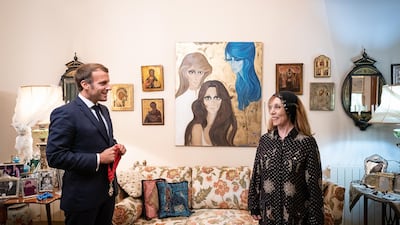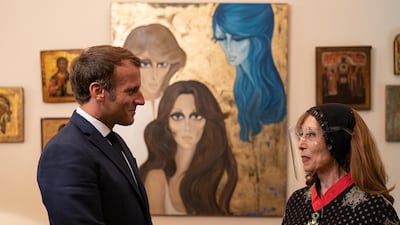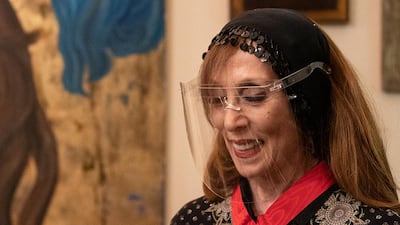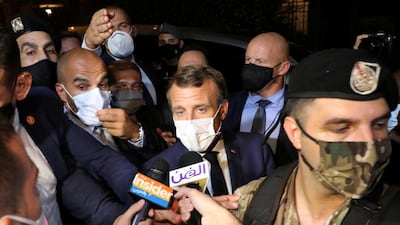Hope ebbs and flows in the poorest parts of Tripoli in north Lebanon, where the dream of better times ahead alleviates, for a moment, the constant struggle to eat, live and earn.
“In our DNA we have this idea that hope comes and goes … we need hope to stay alive,” says Abdul Rahman Harrouk who grew up in Bab Al Tabbaneh, where families have been forced to close small shops and businesses, cutting off the daily income they rely on to survive.
People here are used to being resilient; there is little choice when even before the financial crisis, 57 per cent lived at or below the poverty line in Tripoli and 26 per cent suffered extreme poverty, according to a 2015 study by the United Nations.
But as existing hardships deepen with each consecutive crisis – the financial collapse, the coronavirus and now the Beirut port blast – even this familiar consolation is wearing thin.
“Now people are saying the hope is gone,” Mr Harrouk, 25, says.
In a few weeks he will be able to bring a little comfort to a small number of families who can no longer buy basic essentials when £2,000 (Dh9,819) – raised by a British artist selling prints of renowned Lebanese singer Fairouz – is released from a crowdfunding project set up in the wake of the blast.
With this, he will be able to buy the items requested by families whose income has been reduced to a few dollars a day since the Lebanese currency crashed and food prices tripled, leaving many unable to buy basic items such as milk and rice.
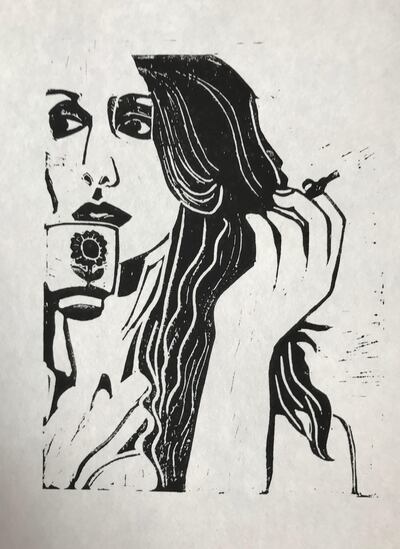
“People in Tripoli needed too many things before this explosion, but now all the NGOs are focused on Beirut, [which] means there is less focus on the community in Tripoli,” says Mr Harrouk, who runs a grass roots initiative called Menna w Fina to support low-income families in the community.
International attention has been trained on Beirut since a massive explosion killed at least 190 people on August 4, injuring more than 6,000 as it decimated swathes of the city and rendered around 300,000 homeless.
Emergency aid followed but French President Emmanuel Macron promised on Tuesday to rally further funds to lift Lebanon out of the financial quagmire that was consuming the country even before disaster struck its capital.
The condition, if France is to help its former protectorate, is for Lebanon’s leaders to enact a series of reforms, beginning with the country’s banking sector.
A day earlier Mr Macron made a widely publicised visit to the famously reclusive Fairouz, who is cherished as a symbol of peace and unity in Lebanon and throughout much of the Arab world.
The 84-year-old singer, whose songs are celebrated across religious and factional divides, captures the nostalgia for Lebanon’s 1950s and '60s heyday, before the 1975-1990 civil war splintered the county and entrenched the sectarian power structure that paralyses its political system today.
That is why artist and humanitarian worker Rachel Smith chose Fairouz' image to raise funds for victims of Lebanon's financial crisis in Tripoli, launching a crowdfund on August 17 selling lino prints of the singer at £25 each.
“I wanted to produce an image which could instantly be attributed to a positive view of Lebanon,” says the 30-year-old, who creates the prints at her flat in Dalston, London and posts them to buyers around the world.

The project, which has another 12 days left to run and is just £85 short of its £2,000 target, spread quickly as friends forwarded the link on social media, passing £1,000 in the first two days.
"I have fond memories of days spent in Tripoli, visiting the citadel, eating sweets at Abdulrahman Hallab & Sons and eating fish sitting down by the sea," she told The National.
But over the past year, friends there described how living conditions in the city – already difficult – had grown steadily worse.
“It’s very clear from visiting Tripoli that there isn’t the wealth of Beirut there. You can see signs of the conflict of years gone by.”
Clashes between Sunni and Alawite residents in Bab Al Tabbaneh and neighbouring Jabal Mohsen have sparked some of the worst bouts of sectarian violence since the end of the civil war and there are fears that mounting poverty could fuel fresh conflict.

Ms Smith chose Menna w Fina because, unlike larger organisations that sometimes distribute food boxes and other aid in the city, it is run by community residents who go house to house and ascertain specific needs.
One neighbourhood might have enough to buy vegetables but not cooking oil, while another wants cleaning products because they are concerned about coronavirus, says Mr Harrouk, who has been running the project for several weeks after coming up with the idea several months ago.
In exchange, the families commit to recycling their waste, raising awareness around the rubbish crisis in the city and providing material for a women’s empowerment project that sorts through the glass and plastic then sells it on. The aim is to create sustainable practices that will help families support themselves through difficult times, he says.
If more funds are raised, he will purchase space for a vegetable garden so families can grow and sell organic produce.
During the pandemic, he liaises with them via WhatsApp due to social distancing rules in Lebanon, where cases of Covid-19 are climbing rapidly.
One woman, whose monthly salary has halved in value due to hyper-inflation, is desperately trying to raise money for her daughter’s medical treatment. Another man messages to say he needs $100 for an operation – money that was possible to find before the crisis in a community where families club together, but is now beyond reach for those who earn in Lebanese lira, now worth 20 per cent of its former value.
Before the pandemic, Mr Harrouk raised funds by hosting camping trips in the mountains, or selling tickets for events at $10 apiece. But lockdown restrictions rendered these activities impossible, making the influx of cash from the Fairouz print sales especially welcome at a time when Tripoli’s poorest are increasingly destitute and the resilience that once sustained them is draining away.
“Before, all these people had almost no money or food,” he says. “Now it’s even more broken and they are living with nothing.”

